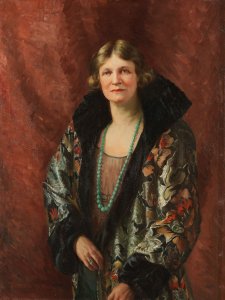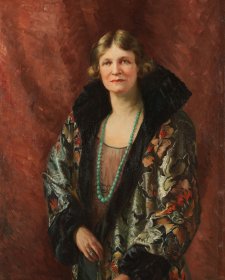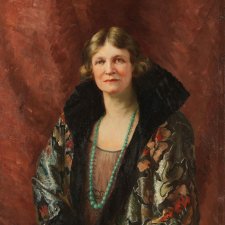Royal Academy-trained artist Reginald Jerrold-Nathan was an established portrait painter before moving from London to Sydney in 1924. In this portrait of his friend, feminist and activist Lady Jessie Street (1889–1970), Jerrold-Nathan’s fondness for depicting women in rich fabrics, furs and jewels can be seen; Street wears a velvet brocade jacket and jade necklace, despite her preference for a suit and comfortable shoes. In Street’s posture and firm gaze, Jerrold-Nathan has suggested her warmth as well as her resolve and resilience.
Street’s 50-year career encompassed achievements on landmark issues such as family planning, equal pay and equal employment. In the interwar years she advocated for unemployment relief, the plight of Jewish refugees and the rights of First Nations peoples. In 1945, she was the sole Australian woman delegate to the founding of the United Nations. Her husband, Sir Kenneth Street, was Chief Justice of NSW from 1950, and for much of the 1950s she worked for the World Peace Council in London. This portrait was displayed in the Street family home in Sydney and for many years it was on loan to the Jessie Street National Women’s Library in Ultimo.
Gift of the Street family and the Jessie Street National Women's Library 2010
© Estate of Reginald Jerrold-Nathan
Jessie Street National Women's Library (1 portrait)
Mrs Belinda Mackay (1 portrait)
Sir Laurence Street (1 portrait)



On one level The Companion talks about the most famous and frontline Australians, but on another it tells us about ourselves.



Penelope Grist explores the United Nations stories in the Gallery’s collection.



Andrew Sayers asks whether a portrait can truly be the examination of a life.